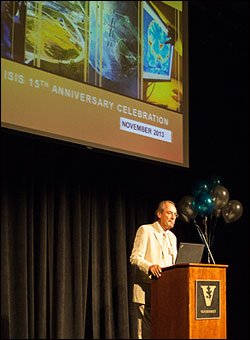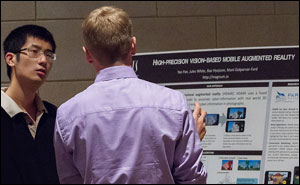In 15 years ISIS has had two growth spurts.
During a three-year period between 2000 and 2003 the Institute for Software Integrated Systems at Vanderbilt reached national recognition as a partner in projects won by academic and industry leaders. In 2010, with awards of multiple large, long-term projects “we became the leads,” said ISIS Director Janos Sztipanovits, E. Bronson Ingram Professor of Engineering, during a 15th anniversary event Nov. 4.

Founded in 1998 and now with more than180 faculty, staff, students and interns involved in more than 60 active projects, ISIS is a key national player in an effort to design the software-integrated systems that have become an integral part of human lives today – in consumer appliances, vehicles, planes, hospitals, schools, design shops, factories, space systems and energy.
“It is our vision to become a top ten research center in the United States,” said Sztipanovits to an overflow crowd in the university’s Student Life Center ballroom. Noting the institute’s growing reputation, he said, “Now, it’s not ‘whom do you work with’ but ‘who wants to work with you.’
ISIS’ major sponsors include the Defense Advanced Research Projects Agency, National Science Foundation, National Aeronautics and Space Administration, National Institutes of Health; Department of Education; United States Air Force, Army, and Navy; Boeing, BAE Systems, Lockheed-Martin, and Raytheon. Academic partners include Harvard, Stanford, Johns Hopkins, MIT, Georgia Tech, University of California-Berkeley, Notre Dame, and others.
Since 1998 ISIS has received $136 million in funding. In 2013 alone ISIS received more than $24 million in extramural research funding. Research expenditures were at $21.6 million with a payroll of $9.4 million. Sztipanovits added, “In fiscal year 2013 ISIS awards were key to Vanderbilt ranking eighth among American universities with the highest level of funding from DARPA.”
 “We have a lot of celebrating to do,” said Provost Richard McCarty. “You [ISIS] have our deepest appreciation for all you’ve done for the university.”
“We have a lot of celebrating to do,” said Provost Richard McCarty. “You [ISIS] have our deepest appreciation for all you’ve done for the university.”
ISIS started with little institutional support, McCarty said, and he credited the leadership of Sztipanovits and of the School of Engineering for achieving an enviable level of excellence that has led to winning significant awards that promise global impact.
School of Engineering Dean Philippe Fauchet said, “We want to be a ‘go-to’ school and ISIS shows us how it is done by establishing itself as a national leader in cyber-physical systems.” ISIS also is responsible for one third of the engineering school’s awards.
“ISIS attracts outstanding computer science and information technology professionals to the fast-growing entrepreneurship culture of the school,” Fauchet said. “Already the school’s largest research institute, ISIS’ rapid growth since 2010 also has contributed to high-tech job creation in the region.”
“The dedication of the ISIS research staff reflects the intensification of their work. Our rapid growth both in awards and workforce has been a welcome challenge … one that also has led to a rise in our national reputation due to accomplishments and commitment of our researchers,” Sztipanovits said.

The celebration concluded with a two-hour reception and poster session where ISIS researchers presented projects where ISIS is making a difference. Some of these included:
- Securing patient records and remote patient monitoring;
- Diagnosing and detecting faults in automobile and aircraft systems;
- Designing a network of independent satellites to work together to perform coordinated missions;
- Building and hosting an innovative Web portal for cyber-physical systems stakeholders;
- Inventing a next-generation sniper location mobile app for battlefield use;
- Mining data and learning analytics to support STEM learning;
- Creating model-based design systems to revolutionize the way military vehicles are built;
- Converting commercially available smartphones into tools for troops; and
- Making open-source middleware – software that integrates diverse systems, networks and hardware – widely accessible for use successfully by thousands of companies globally.